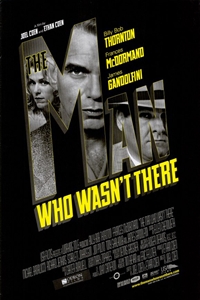The Man Who Wasn't There (R) ★★★
 A black-and-white film with a noir-like plot about a chain-smoking, unhappily married barber whose blackmail attempt is foiled by a series of ironic mishaps.
A black-and-white film with a noir-like plot about a chain-smoking, unhappily married barber whose blackmail attempt is foiled by a series of ironic mishaps.
Story
Set in 1949 in the quiet California town of Santa Rosa, the story centers on Ed Crane (Billy Bob Thornton), who is a second-chair barber in his brother-in-law Frank's barbershop (Michael Badalucco). Ed's wife Doris (Frances McDormand) is having an affair with
her boss, hotshot department store owner Big Dave (James Gandolfini). When Ed gets an investment tip on the future of dry cleaning, he decides it's time to cash in his chips so he blackmails Big Dave. Big Dave, married to wealthy heiress Ann (Katherine Borowitz), is not about to let this
financial pressure get the better of him (come on now, this is Tony Soprano Ed's messing with). Things quickly spiral out of control (someone's murdered), slow down (Ed narrates, Ed smokes, narrates, smokes some more), and then just get weird (something involving UFO sightings and a teenage pianist) before coming to an electrifying end.
Acting
The film's lineup is impressive: Thornton, McDormand, Gandolfini, Badalucco, Scarlett Johansson, Tony Shalhoub. Yet the cast seems as constrained as a prisoner in jail, waiting for breaks in Ed's narration to shine. The reliance on voice-over narration
to get the story across impedes the dramatic and comedic timing and much of the acting, except of course that of the Bogart-like Ed. We're captivated by him whether we like it or not--he is the only one that can tell us what the hell is going on. Unfortunately, he loses a lot of credibility because although he assures us he's a quiet man of few words, he never shuts up.
Direction
Joel Coen and Ethan Coen (Fargo) did what they set out to do--which was create an impressive, smart, modern, take on '40s film-noir classics like The Postman Always Rings Twice. Watch this movie for the unprecedented black-and-white cinematography of Roger Deakins, who takes inspiration from the Coens and turns what many moviegoers expect from a black-and-white picture on its head. Mainstream audiences may have difficulty with the slow, methodical pace of this movie and some things drag the film down, like the UFO subplot. But the Coens have a reason for all things, leaving much to the viewer's interpretation. Perhaps the directors employed the same theory as the defense attorney does in the movie, the 'uncertainty principle'--the more you look at something, the less you know.
Bottom Line
This is not your grandparents' black-and-white film. It's worth seeing if you are a cinematographer buff or a Coen brothers buff, and don't mind having a story narrated to you for almost two hours.
To get the full Quicklook Films experience, uncheck "Enable on this Site" from Adblock Plus
box office top 10

Civil War Released: April 12, 2024 Cast: Kirsten Dunst, Wagner Moura 11.1M

Abigail Released: April 19, 2024 Cast: Melissa Barrera, Dan Stevens 10.2M

Godzilla x Kong: The New Empire Released: March 29, 2024 Cast: Rebecca Hall, Brian Tyree Henry 9.5M

The Ministry of Ungentlemanly Warfare Released: April 19, 2024 Cast: Henry Cavill, Eiza Gonzalez 9M

Spy x Family Code: White Released: April 19, 2024 Cast: Takuya Eguchi, Saori Hayami 4.9M

Kung Fu Panda 4 Released: March 8, 2024 Cast: Jack Black, Viola Davis 4.6M

Ghostbusters: Frozen Empire Released: March 22, 2024 Cast: Paul Rudd, Carrie Coon 4.4M

Dune: Part Two Released: March 1, 2024 Cast: Timothée Chalamet, Rebecca Ferguson 2.9M

Monkey Man Released: April 5, 2024 Cast: Dev Patel, Sikandar Kher 2.2M

The First Omen Released: April 5, 2024 Cast: Nell Tiger Free, Bill Nighy 1.7M






